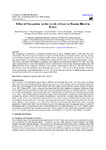Effect of Occupation on the Levels of Lead in Human Blood in Kenya

View/
Date
2013Author
Mogwasi, Richard
Nyagaka, Benuel
Okiambe, Enock
Nyambaka, Hudson
Murungi, Jane
Getenga, Zachary
Amboga, Enock
Onyancha, Evans
Abuga, Samuel
Kenanda, Evans
Metadata
Show full item recordAbstract
The occupation an individual is involved in exposes him or her to different levels of lead from the work environment. The main occupation of the study subjects included working in the petrol stations, teaching, nursing, street hawking, doing clerical work, working in public vehicles, farming and schooling. The aim of the study was to determine the effect of occupation on the lead levels in human blood in Nairobi City and Nyamira District, Kenya. The subjects involved in the different occupations were randomly selected and recruited for the study. The study used a questionnaire to assess lead exposure factors of the recruits, while atomic absorption spectroscopy and differential pulse anodic stripping voltammetry were used for determining the lead levels. The street hawkers in Nairobi City centre had the highest mean blood lead level of 36.8516.98 μg/ dl while the teachers of Nyamira Town had the lowest mean blood lead level of 8.1 5.3 μg/ dl. The study provides an additional data pointing to elevated blood lead levels in occupationally exposed individuals.
